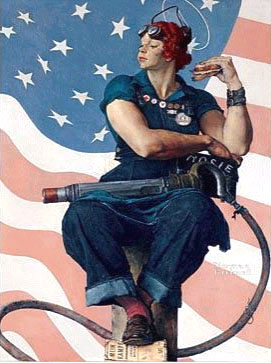This is the music that was popular in the United States and
Great Britain in the last half of the 40s and first few years of the 50s.
Some of it is the music that the maquis of the French resistance flaunted
in the face of their German oppressor during the darkest days of the
Occupation.
The radio blared Swing side-by-side with crooners lamenting about
the boys coming home. Songs about what-if-I-never-to-come-home? and
what-you-should-do-while-I'm-away and
what-you-should-not-to-do-while-I'm-away and
what-we'll-do-when-I-come-home-(that-is-if-I-come-home) filled the
airwaves. Dressed in coveralls, Rosie the Riveter hummed a light-hearted tune and dreamed about
boys while she made guns and tanks and planes in such numbers, she
established the U.S. as "the Arsenal of Democracy."
Lili Marlenethe Lonely side of war
The private, somber side of war found
voice in a simple song called Lili Marlene.
Lili Marlene, which tells a tale of love, separation, and
longing, touched a nerve in soldiers on both
sides in two world wars.
- See what happened when Lili Marlene became a popular war song:
click here.
A Slip Of the Lip
(Can Sink A Ship)the dangerous side of
war
L. Henderson and Mercer Ellington (Duke's son) put the Slip of the Lip
idea to music when they wrote A Slip of the Lip (Can Sink a Ship) in 1942.
We hear the original 1942 performance sung by Ray Nance.
- Hear a portion of the Slip of the Lip song:
click
here.
Rosie the Riveterthe heartland
 |
| The 1943 Saturday
Post featured a cover of Rosie painted by Norman Rockwell. It was
published by the
Curtis Publishing
Company, Indianapolis, Indiana.
Notice the medals on Rosie's chest, presumably awards for meeting production
goals. |
In 1942 Evans and Loeb wrote a song to honor the Rosies of the war and
named it Rosie the Riveter. It became the symbol of Rosies
everywhere. The performance below was recorded by the Four vagabonds in
1943.
- Hear a portion of the song that honors Rosie the Riveter:
click
here.
Note the references to ...helping her man, ...sabotage
(c.f., A Slip of the Lip), and ...a Production E, which
stood for Efficiency. It took Evans and Loeb only about a minute to work
all three topics into their song. These three topics were among those
drummed into everyone's heads by wartime propaganda machinery; including
them couldn't hurt the song's chances of getting published.
Rosies shared the same desire for victory that all Americans shared. In
addition, they had many motives that were specific to their sex. Some wanted to prove once and for all that women had what it took, which
they did. Others worked to put themselves in the thick of the fight.
A Rosie felt that she was helping her man in
uniform, no matter how indirect that help might be.
Many Rosies stayed loyal to
their man throughout the war and greeted him on his return. Sadly, many others did not.
All too often, a Rosie would send a Dear John letter to the front to
inform her soldier or sailor that she had had second thoughts about him,
had lost interest, or had found anothera real morale
buster.
- Visit a web site dedicated to the women who worked in WWII factories
and shipyards:
click here.
Richmond, Washington was home to 56 different
war industries, more than any other city of its size in the United States. The National Park Service has created a Rosie the Riveter park in
Richmond to honor their service.
- Visit the NPS Rosie the Riveter web site:
click here.
The B-17 Flying Fortress was built by Boeing in Seattle, Washington.
Thousands of B-17s were built there by thousands of Rosies.
- See pictures of some of these women and read the story of one of
these heroines at the EAA web site:
click here.
Norman Rockwell created his own version of Rosie for a 1943 Saturday
Evening Post magazine cover. In 2002 the original painting was auctioned
by Sotheby's for almost $5 million.
- Read the story behind the Norman Rockwell cover painting of Rosie.
Visit the Rosie the Riveter web site:
click here.
Did you know that in 1999 a U.S. postage stamp was issued to honor
Rosie's contribution to the war effort?
- See an image of the stamp above on this page:
click here.
- Visit the Stamps.net web site for details:
click here.
the Duckworth chantthe indoctrination
No matter where he went in the battle zone, a GI could expect Kilroy to
have beaten him there. Jody was another mythical figure akin to Kilroy. As
the line in the chant goes, "Jody was there when you left."
Jody was always "there" when a GI left home to join up.
Jody's job was to stay behind and fill the recruit's shoes with his girl
when the recruit was no longer there to guard his nest. Jody is still
playing this role in today's U.S. army. Jody is memorialized in the Duckworth Chant.
The Duckworth Chant, written by Pfc. Willie Duckworth, was
popularized by Vaughn Monroe in a record he made called Sound Off. The original recording of the chant was performed by Sgt. Henry Felice and
the Rehabilitation Center Class at Fort Slocum near New Rochelle, N.Y. and
was recorded on a special unnumbered V-Disc in 1945. (More about V-Discs
later). You may recognize the melody and format; it's a classic
reminiscent of chants like it that were done by other army units throughout the war, chants that have been performed in and between wars ever
since. It's a gem.
This is the armythe
morale boosters
Irving Berlin organized and wrote a musical about army life called
This Is the Army. The musical was performed by genuine U.S. Army
draftees and enlisted men. It toured the United States to raise money for
army war relief, sell U.S. War Bonds, and bolster moral. This Is the
Army was in part a recreation of a similar musical Berlin wrote in WWI
called Yip-Yip-Yaphank, which had the same objectives.
Berlin had originally written his great war song, Oh, How I Hate to
Get Up in the Morning, a brilliant and clever depiction of the
realities of barracks life, for the WWI musical Yip Yip Yap Yank.
Berlin was not naturally an early riser, and the song has an
autobiographical bent that makes it all the more appealing. Berlin had
dressed in uniform every night to sing it. It was about himself.
Now, in WWII, This Is the Army featured the same song in an
almost identical scene that recreated the first bygone performances in
WWI. Despite his age, Berlin again dressed in uniform every night to sing
Oh, How I Hate to Get Up in the Morning, this time with a
chorus of WWII soldiers instead of WWII soldiers.
After WWII, This Is the Army was made into a Hollywood musical,
a movie still occasionally shown on television. In the movie, Berlin
performs the same song in the same scene, still in his WWI uniform. This
scene in the movie is a must-see.
Here we offer three excerpts from the original cast recording of the Oh, How
I Hate to Get Up in the Morning scene from This Is the Army, a
recording made on July 28, 1942. The lead voice is that of the great Irving
Berlin singing his own composition.
- Hear the cast set the scene for the reenactment:
click here.
- Hear Irving Berlin sing the verse and refrain:
click here.
- Hear Irving Berlin and chorus sing the finale:
click here.
a zoot suit (For My Sunday Gal)hep cats, zoot suiters,
and subversives
Are you in the groove? Can you "dig a zoot suit with a reet pleat
and a drape shape and a stuff cuff to look sharp enough to see your Sunday
gal?" Want to hear more of this once-cool but now quaint jive talk?
Explore the 1941 song called A Zoot Suit
(For My Sunday Gal). It's a great way to transport yourself to wartime America when the zoot suit was all the
rage and Swing was the thing.
|
Explore A Zoot Suit
(For My Sunday Gal)
This is the fifth page of the feature titled Gone But
Not Forgotten: Welcome to Music of the Second World War Era.
Where to next?
Happy Swinging! |
Much more about zoot suits and zoot suiters
Hep
is a word from a dead form of slang called jive
talk. It may be a dead language now, but in WWII jive talk was in. Jive
was the language of cool cats, and no cats were cooler than zoot suiters.
Explore the zoot suit men and women, the suit, and the
history, including the Zoot Suit Riots and the French Zoot Suiters, the Zazous.
click here |
...Coming.


